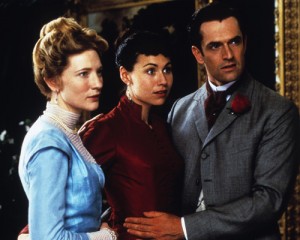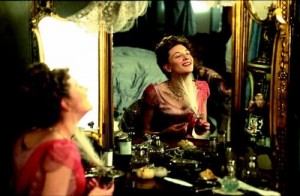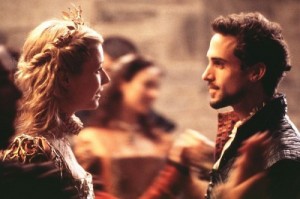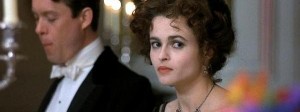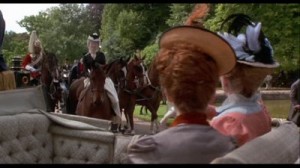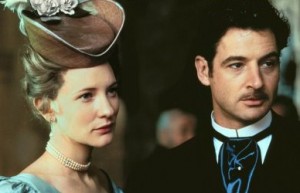From the Chicago Reader (June 25, 1999). — J.R.
An Ideal Husband
Rating *** A must see
Directed by Oliver Parker
Written by Oscar Wilde and Parker
With Cate Blanchett, Minnie Driver, Rupert Everett, Julianne Moore, Jeremy Northam, John Wood, Lindsay Duncan, Peter Vaughan, and Jeroen Krabbe.
Reviewing a collection of Oscar Wilde’s critical writings almost 30 years ago, Cyril Connolly made a useful distinction between “Wilde” and “Oscar,” the two sides of the same man. “Wilde is Wilde in these essays and seldom ‘Oscar,'” Connolly noted with justifiable admiration. “The change is beneficial. In some cases he is both: thus The Soul of Man Under Socialism in places seems almost inspired; it is a breath of fresh air in which the idealistic aspects of Socialism (or Christian Democracy) have seldom been so well expressed — in his denunciation of private property for example.
“Then ‘Oscar’ intervenes. ‘There is only one class in the community that thinks more about money than the rich, and that is the poor. The poor can think of nothing else.‘”
Connolly goes on to explain, “When I think of ‘Oscar,’ it is against a background of servants, of butlers announcing him and footmen with salvers, of a hansom cab hired by the day, the driver nodding under his tarpaulin while Wilde and Bosie display far into the night.”
I’ve seen An Ideal Husband, writer-director Oliver Parker’s adaptation of Oscar Wilde’s 1895 play, twice — once before reading the original and once after. In Connolly’s terms, it was a bit like going from Oscar to Oscar plus Wilde and then back to Oscar again.
I don’t mean to imply that Oscar isn’t a witty and entertaining fellow; indeed, he’s so much of one under Parker’s guidance that he’s never allowed to be anything else for long. Wilde, the more serious author of the brilliant “The Critic as Artist,” an essay in the form of a dialogue, is never allowed to be much of anything. This doesn’t mean that Parker should have adapted Wilde instead of Oscar. Much of the four acts of An Ideal Husband, a serious comedy, is constructed out of flip one-liners, most of which remain, though Parker has added a few, all unworthy of the master (including one about the proverbial frying pan and the fire). In the movie Wilde the serious author is a bit like the cameo of him (Michael Culkin) offering a beaming curtain speech after one of his plays; most of the characters are attending the play, but most of them aren’t paying much attention to the speech. In a way, that seems to be how we’re expected to attend to this play and its author–our focus skipping like a rock from one epigram to the next, while we take in the opulent, continually shifting scenery, the frequently changing formal attire, and the intermittent, delightfully incongruous bursts of Gypsy music, which makes the whole thing feel like a musical.
Apparently the filmmakers don’t entirely trust either the material or the audience, an attitude fully evident in the doublespeak of the press book — a sharp contrast to the rare confidence Wilde placed in both. “What is your feeling towards your audiences — towards the public?” Wilde was asked by a journalist shortly after An Ideal Husband opened at London’s Royal Theatre. “Which public?” Wilde replied. “There are as many publics as there are personalities.” But this was before test marketing and second-guessing turned the public into a single hypothetical infant yowling to be stroked and fed. The movie’s ad copy reeks of the same sort of duplicity of cheerful intentions as the patter designed to sell Shakespeare in Love and The Wings of the Dove, two other recent literary confections whipped up according to the matchless Miramax recipe:
“When asked why they thought Oscar Wilde’s play An Ideal Husband was a candidate for screen adaptation, the filmmakers all agreed: it seemed to have been written yesterday. ‘I thought it had terrific contemporary connections’ says Director Oliver Parker. Producer Uri Fruchtmann recognized that the piece has an agelessness which would make it pertinent to the modern viewer despite the fact that it was written over 100 years ago: ‘I think all good plays are relevant because all good plays are about people. Fundamentally, people have not changed.’
“All the filmmakers were thrilled with the script from the very first draft. Producer Barnaby Thompson observed: ‘What he’s done really well is that he’s kept the Wildean world but at the same time given it a firmer emotional base. He’s given all the characters a real emotional journey.’ Producer Uri Fruchtmann agreed that in some respects Oliver had strengthened the story: ‘It may be blasphemous, but I believe that in many ways Olly’s adaptation is better structured than the original play. The play feels at times like a vehicle primarily for all those wonderful quotes and wonderful dialogue. Olly strengthened the characters and the relationships between the characters. He focused it.’ Cate Blanchett (Lady Gertrude Chiltern) agrees: ‘It’s sacrilege, but I prefer it to the stage play. To my mind, Oliver solved the problems of the plot resolution a lot more satisfactorily.’”
Missing from this hyperbolic account is how Miramax’s meddlesome Harvey Weinstein probably took this improved structuring and strengthened adaptation of an already terrifically contemporary, people-oriented play and made it even more terrifically contemporary, structured, strong, and people-oriented through his customary process of “improving” whatever merchandise he feels like getting behind. Whether this meant rescoring (as he insisted be done for The Wings of the Dove) or recutting or something else, we may never know.
I don’t mean to suggest by any of the above that I didn’t enjoy the results. I willingly stayed to the end both times, which I did only out of professional necessity the single time I saw The Wings of the Dove and which I didn’t do when I finally made it to Shakespeare in Love. The only problem I was faced with was trying to understand what exactly it was that I enjoyed, and how this movie differed from the play I’d read.
One thing I enjoyed was Parker’s clever subterfuge at the beginning, which persuaded me that I was watching at least three other movies. The play simply and grandly opens at Sir Robert and Lady Chiltern’s party. But Parker introduces us to the cast, then to languid Lord Goring (Rupert Everett) being delivered his morning paper by his loyal servant Phipps (Peter Vaughan) while an unidentified naked woman emerges from his bed. Then an item in the paper about the upcoming party is read offscreen, followed by the title “1895 — The London Season, where people are looking for husbands…or hiding from them,” which ushers us into a decorous scene in a park — basically the opening of Vincente Minnelli’s Gigi without Maurice Chevalier. In the park most of the major characters meet one another and are simultaneously introduced to us. Next we get a crafty montage of people getting dressed for the party — centered on Lord Goring, who tries out some of Oscar’s one-liners on Phipps — before we finally wind up at the play’s starting point.
Ernst Lubitsch’s 1925 movie of Lady Windermere’s Fan threw out all but two or three of Oscar’s epigrams and tried to duplicate their essence in his elegant mise en scene: another form of blasphemy or sacrilege perhaps, but this was a silent movie, and Lubitsch was every bit as eager as Parker to avoid canned theater. Parker’s solution isn’t so much mise en scene as postmodernist pickings from Eric von Stroheim (showing the hero first in his bedroom), Minnelli (the park puffery), and Lubitsch (the dressing up) — a vest-pocket anthology of Hollywood evocations of continental glitz, sprinkled with exposition and nuggets of both Wilde and Parker (the crack about husbands) to hustle us along. It’s the kind of overdetermination calculated to floor us at the outset, and its aim is to introduce us to a spread, not to characters. Sir Robert Chiltern is the hero of the play, but Lord Goring is the hero of the movie, which has smaller fish to fry.
We eventually get to spend some quality time at Oscar’s and the Chilterns’ party, but the twitchy scene shifting — another carryover from Gigi — generally keeps us on the run and never allows us to become too preoccupied with these people and their relationships and what they stand to lose, Wilde’s main preoccupation. Mrs. Cheveley (Julianne Moore), a former lover of Goring’s who has invested in an Argentinean canal scheme, tries to blackmail Sir Robert (Jeremy Northam) into supporting the canal, which he regards as a “swindle,” in Parliament by threatening to reveal a letter he wrote that facilitated speculation in the Suez Canal before the government announced its intentions. Known to his wife as impeccably scrupulous and honest, Sir Robert risks losing her respect and affection if the letter is produced and risks losing his credibility with everyone, himself included, if he supports the canal. The major go-between in this intrigue is Lord Goring, Sir Robert’s best friend, who also happens to have a flirtatious relationship with Sir Robert’s sister (perfectly played by Minnie Driver).
The movie is attentive to Wilde’s plot but relatively impatient with what it signifies as long as it can find more spreads and epigrams to distract us with. Goring is a clear stand-in for Oscar, which the film plays for everything it’s worth, yet it avoids showing the degree to which Sir Robert is an equally relevant, if less obvious, stand-in for Wilde. If Goring embodies Oscar’s wit, Sir Robert, accorded few of the one-liners, embodies Wilde’s social position, which was already threatened.
The play opened only two months before Wilde had Lord Queensberry, Bosie’s father, arrested for criminal libel and only three months before the case went to court. Lord Queensberry was acquitted, and Wilde was arrested on charges of “committing acts of gross indecency with other male persons,” sealing his fate as a martyr for gay rights.
“Art should never try to be popular,” Wilde argued in The Soul of Man Under Socialism. “The public should try to make itself artistic.” Given the rousing popular success of An Ideal Husband in 1895 — and the abject failure of Henry James’s Guy Domville, which opened in London two days later — this sounds less than candid coming from Wilde, so maybe the remark should be attributed to Oscar.
But George Bernard Shaw, who reviewed the two plays together as his first column for Frank Harris’s Saturday Review, took Wilde at his word: “All the literary dignity of the play, all the imperturbable good sense and good manners with which Mr. Wilde makes his wit pleasant to his comparatively stupid audience, cannot quite overcome the fact that Ireland is of all countries the most foreign to England, and that to the Irishman (and Mr. Wilde is almost as acutely Irish an Irishman as the Iron Duke of Wellington) there is nothing in the world quite so exquisitely comic as an Englishman’s seriousness.” By regarding his own audience as comparatively stupid and unserious, Parker ignores part of Wilde’s wit, even as he makes the remainder as pleasant and entertaining as possible.

